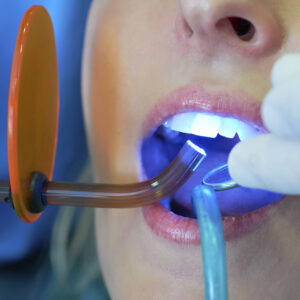
Dental filling is relatively non-invasive and very common dental procedure, after which patients may experience some mild to moderate pain and discomfort and wonder if that’s normal.
I want to offer some helpful tips on what you should do and not do after a dental filling is placed and when is necessary to go back to see your dentist about the discomfort you are experiencing.
- First: after an anesthetic has been used, your lips, cheeks and tongue may be numb for several hours after the appointment. Make sure that the local anesthetic has completely worn off before chewing. It’s easy to bite on and injure your lip, cheeks or tongue. Also, avoid drinking hot beverages or smoking to prevent burning the numb tissues.
- You may also find it difficult to swallow while your tongue is still numb. Don’t panic, as long as you don’t have trouble breathing all will pass.
- It is normal to experience some hot/cold sensitivity and sensitivity upon biting after your appointment. This is usually reaction of the nerve following the procedure. Due to the vibrations during the tooth preparation and drilling off the decay, the nerve experience a lot of turbulence that can cause temporary inflammation and slight swelling of the pulp (fleshy part, right in the middle of the tooth). Considering that the pulp is in confined space the swelling causes pressure on the nerve which directly associates with temperature sensitivity and discomfort upon biting. The deeper the cavity, the higher the risk is for nerve irritation. Usually resolves on its own in few days to a week. OTC medicine like Motrin and Tylenol every 6 hours for three days and limit chewing on the side should work well to alleviate the tenderness.
- Most dentist now place tooth colored resin type fillings. These fillings are completely hardened when you leave the office and when numb hard to evaluate if the new filling lines up properly with the rest of the teeth. It is not unusual to find out after the anesthetic wears off that your bite is off. As a result of filling even slightly higher than the rest, an extra pressure is applied on the tooth every time you close your mouth so that tooth gets sensitive on the second day
- High spot on the new restoration causing misaligned bite must be adjusted. If you suspect that this is the reason for your sensitivity, do not wait for it to wear down on its own as the tooth may become too tender. It is better to visit your dentist and have your bite adjusted. It is easy and will bring instant relief.
- If pressure sensitivity persists beyond a week or if the sensitivity to hot or cold worsen please call your dentist to have it checked.
- Teeth with fillings can still get cavities, especially around the edge of the filling. In fact, they are more susceptible than virgin teeth. Proper and regular brushing and flossing is a must. ACT or other fluoride containing rinses are very good aid in your daily hygiene routines


